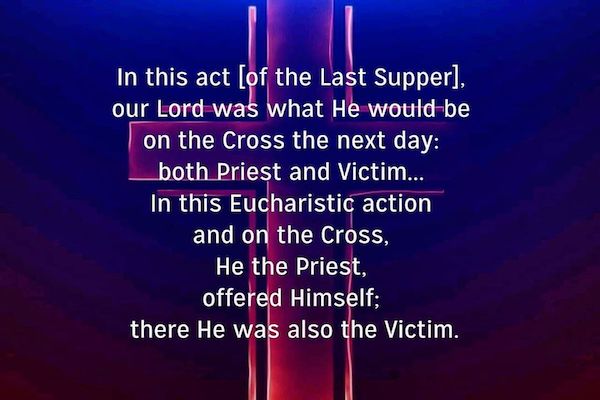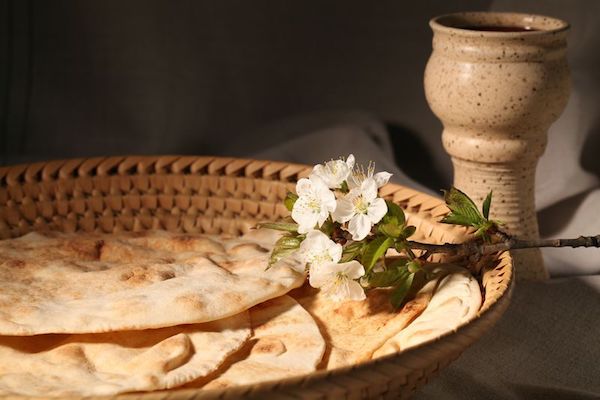LENT 2024: Day 14 - LIFE OF CHRIST

LENT 2024: DAY 14 - Thursday February 29
“The Hour of His exaltation having come, for within less than twenty-four hours He would surrender Himself, He gathered His twelve Apostles about Him In one sublime act He interpreted the meaning of His death. He declared that he was marking the beginning of the New Testament or Covenant ratified by His sacrificial death The whole Mosaic and pre-Messianic system of sacrifice was thus superseded and fulfilled.
Since His death was the reason for His coming, he now instituted for His Apostles and posterity a Memorial Action of His Redemption, which He promised when he said that He was the Bread of Life. “He took bread and blessed and broke it, and gave it to them, saying, This is My Body, given for you.” (Luke 22:19)
Then taking wine into His Hands, he said: “Drink, all of you, of this; for this is My Blood of the New Testament, shed for many, to the remission of sins.” (Matthew 26:28)
His coming death on the following afternoon was set before them in a symbolic or unbloody manner… In this act, Our Lord was what He would be on the Cross the next day: both Priest and Victim. In the Old Testament and among pagans, the victim, such as a goat or a sheep was apart from the priest who offered it. In this Eucharistic action and on the Cross, He, the Priest, offered Himself; there He was also the Victim.
Next came the Divine command to prolong the Memorial of his death: “Do this for a commemoration of Me.” (Luke 22:19)
Why did Our Blessed Lord use bread and wine as the elements of this Memorial?... No two substances in nature have to suffer more to become what they are than bread and wine. Wheat has to pass through the rigors of winter, be ground beneath the Calvary of a mill, and then subjected to purging fire before it can become bread. Grapes in their turn must be subjected to the Gethsemane of a wine press and have their life crushed from them to become wine. Thus do they symbolize the Passion and Sufferings of Christ, and the condition of Salvation, for Our Lord said unless we die to ourselves we cannot live in Him… There are no two substances in nature which have more traditionally nourished man than bread and wine. In bringing these elements to the altar, men are equivalently bringing themselves.
But because Our Lord’s Memorial was not instituted by His disciples but by Him, and because He could not be conquered by death, but would rise again in the newness of life He willed that as He now looked forward to his redemptive death on the Cross, so all the Christian ages, until the consummation of the world, should look back to the Cross… What He did, looked forward to the Cross; what they did… was to look back to His redemptive death… He broke the bread to set forth the breaking of His own human Body also to show that He was a Victim by His own free will. He broke it by voluntary surrender, before the executioners would break it by their voluntary cruelty.
Our Lord never told anyone to write about His Redemption, but He did tell His Apostles to… commemorate it… He wanted men not to be readers about His Redemption, but actors in it, offering up their body and blood with His in the re-enactment of Calvary, saying with Him, ‘This is my body and this is my blood’ dying to their lower natures to live to grace… that the Heavenly Father looking down on them would see them in His Son.”

(Chapter 36, pgs. 593-600)
+ FRASES PARA LEER